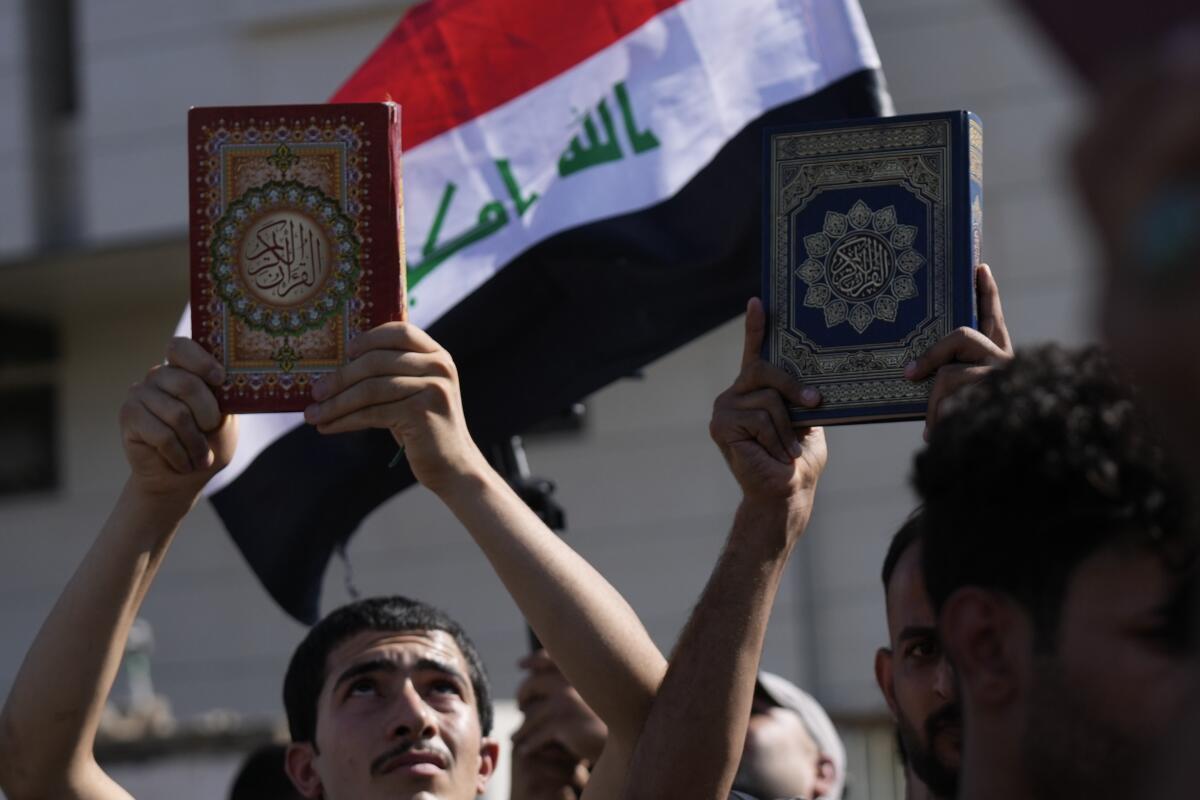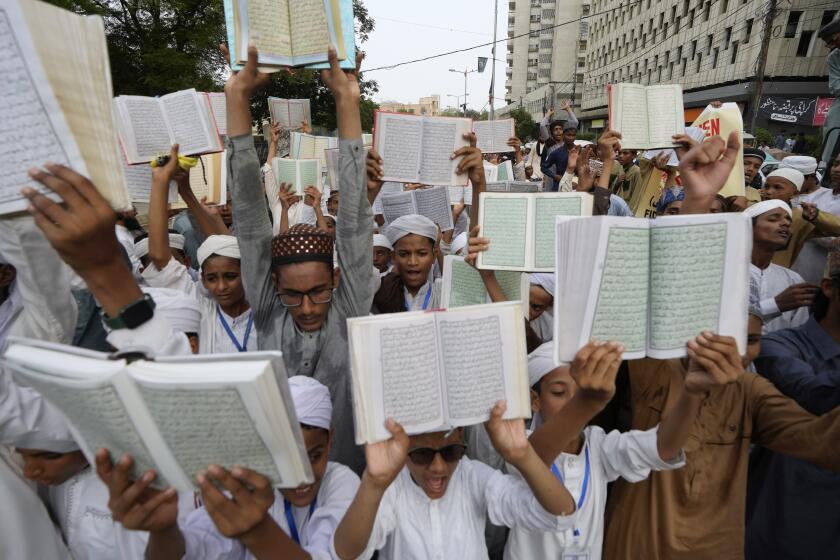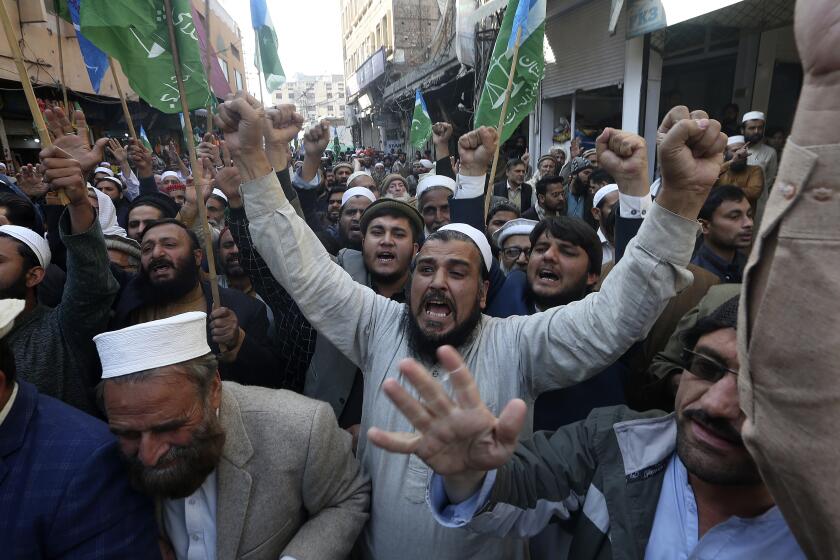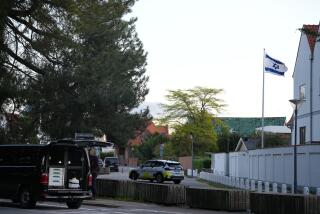Protesters in Iraq storm Swedish Embassy in Baghdad amid continuing anger over Quran burning

- Share via
BAGHDAD — Protesters angered by an Iraqi man in Sweden who threatened to burn a copy of the Quran stormed the Swedish Embassy in Baghdad early Thursday, overrunning the diplomatic compound and starting a fire.
Hours later, Iraq’s prime minister cut diplomatic ties with Sweden in protest over the desecration of the Islamic holy book.
Protesters occupied the diplomatic post for several hours, waving flags and signs showing the influential Iraqi Shiite cleric and political leader Muqtada al-Sadr, and setting a small fire. The embassy staff had been evacuated a day earlier.
The attack came ahead of a protest by an Iraqi asylum seeker who burned a copy of the Islamic holy book during a previous demonstration last month. He threatened to do the same thing again in Stockholm.
After protesters left the Swedish Embassy, diplomats announced it had closed to visitors, without specifying when it would reopen.
A Quran burning and requests for protests to destroy holy books, including the Bible, leave Sweden torn between free speech and respect for religious minorities.
Following a meeting with security officials, Iraqi Prime Minister Mohammed Shia al-Sudani said in a statement that Iraqi authorities would prosecute those responsible for starting the fire and referred to an investigation of “negligent security officials.”
However, the statement also said that the Iraqi government had informed Sweden on Wednesday that Iraq would cut off diplomatic relations should the Quran burning go forward.
Sudani soon announced he had ordered the expulsion of the Swedish ambassador from Iraq and the withdrawal of the Iraqi charge d’affaires from Sweden.
The announcement came after two men held an anti-Islam protest on a lawn about 300 feet from the Iraqi Embassy in Stockholm. One of them was identified by Swedish media as Salwan Momika, an Iraqi of Christian origin who lives in Sweden as a self-identified atheist. He stepped on and kicked the Quran but did not set it on fire.
Momika also stepped on and kicked an Iraqi flag, as well as photographs of al-Sadr and of Iran’s supreme leader, Ayatollah Ali Khamenei.
About 50 people, including journalists and a handful of counter-demonstrators chanting religious slogans, watched the demonstration from behind police barricades as plainclothes and uniformed officers stood by.
Following the protest and Sudani’s announcement, the head of Iraq’s Media and Communications Commission announced that the agency had suspended the license of Swedish communications company Ericsson to operate in Iraq. The Ministry of Communications later said it would sever all its dealings with Swedish companies.
Before the protest in Stockholm, dozens of men climbed over the fence at the complex containing the Swedish Embassy in Baghdad. Video footage showed men trying to break down a door, setting a fire and standing, some shirtless in the summer heat, inside what appeared to be a room at the embassy, with an alarm audible sounding in the background.
Others later performed pre-dawn prayers outside the embassy.
Protesters in several Middle Eastern countries denounce the desecration of Islam’s holy book by far-right activists in Sweden and the Netherlands.
As dawn broke, police and other security officials gathered at the embassy as firefighters tried to douse the flames. Some demonstrators remained at the site, apparently left alone by police.
An Associated Press photographer and two Reuters staff members were arrested while covering the protest and released several hours later without charges.
The Swedish Foreign Ministry said in a statement that its staffers were safe and that attacks on embassies and diplomats violate the Vienna Convention. “Iraqi authorities have the responsibility to protect diplomatic missions and diplomatic staff.”
Swedish Foreign Minister Tobias Billström said the ministry would summon Iraq’s charge d’affaires in Stockholm.
The Finnish Embassy in Baghdad is adjacent to the Swedish Embassy in an area enclosed by blast walls. Finland’s ambassador to Iraq, Matti Lassila, told Finnish public broadcaster YLE that the staffs of both embassies were evacuated Wednesday.
Iraq’s Foreign Ministry also issued a statement condemning the attack and promising to hold the perpetrators accountable, without explaining how the breach happened or identifying who carried out the assault.
Stockholm police spokesman Mats Eriksson confirmed that police had granted permission for a demonstration involving two people outside the Iraqi Embassy in Stockholm on Thursday. He could not say whether the protesters planned to burn the Quran, although Momika had announced that in videos posted on social media.
The right to hold public demonstrations is protected by the constitution in Sweden. Blasphemy laws were abandoned in the 1970s. Police generally give permission based on whether they believe a public gathering can be held without major disruptions or safety risks.
For Muslims, the burning of the Quran represents a blasphemous desecration of their religion’s holy text. Quran burnings in the past have sparked protests across the Muslim world, some turning violent. In Afghanistan, the Taliban suspended all the activities of Swedish organizations in the country in response to the recent Quran burning.
Last month, a man identified by local media and on his social media as Momika burned a Quran outside a Stockholm mosque during the major Muslim holiday of Eid al-Adha, triggering widespread condemnation in the Islamic world.
A similar protest by a far-right activist was held outside Turkey’s Embassy earlier this year, complicating Sweden’s efforts to convince Turkey to let it join NATO.
In June, protesters who support al-Sadr stormed the embassy in Baghdad over that Quran burning. Another day of protests saw thousands of demonstrators on the streets in the country.
Al-Sadr, the son of a prominent Shiite cleric assassinated in a 1999 attack believed to be organized by Iraqi dictator Saddam Hussein, quickly organized Shiites dispossessed under Saddam against the American occupation after the 2003 U.S.-led invasion.
Saddam loyalists and Shiite extremists alike later fought an insurgency against the American forces. Al-Sadr’s forces are believed to have later taken part in the sectarian killings between Shiites and Sunnis that plagued Iraq for several years after the bombing of one of the holiest sites in Shiite Islam.
Since that time, al-Sadr’s followers have taken part in Iraqi military offensives against the Islamic State group in Tikrit and other cities and in rallies against government corruption.
Al-Sadr claimed he would bow out of politics last August, following a nearly yearlong deadlock in the formation of a new Cabinet. His party won the largest share of seats in the October 2021 parliamentary elections, but not enough to secure a majority government. His resignation prompted violent street protests by his followers.
In a televised speech to his supporters Thursday evening, al-Sadr urged other Arab and Muslim countries to “take action” against Quran burning and mocked the United States, which earlier in the day released a statement condemning the storming of the Swedish embassy.
More to Read
Sign up for Essential California
The most important California stories and recommendations in your inbox every morning.
You may occasionally receive promotional content from the Los Angeles Times.










